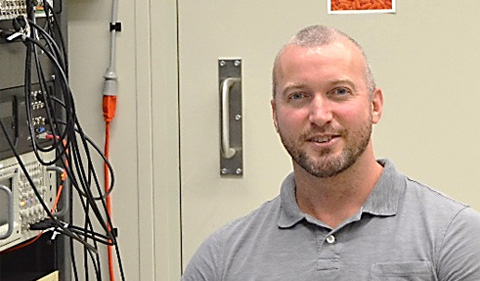Dr. Mitchell Day, Assistant Professor of Biological Sciences, received an Ohio University Research Award for experiments that will be the first physiological study of how sensorineural hearing loss affects brain processing of sound source location.
“Our hope is that knowledge of how this type of hearing loss changes the brain will lead to the creation of sound processing algorithms for hearing aids that will improve spatial hearing for individuals with sensorineural hearing loss,” Day said.
Sensorineural hearing loss is the most common form of permanent hearing loss, affecting between 10 to 40 million Americans under the age of 70. It is usually caused by cumulative overexposure to loud sounds. Individuals with sensorineural hearing loss must wear hearing aids to boost the volume of sound in order to hear it. However, even with boosted volume, these individuals have a decreased ability to localize where a sound comes from, as well as a decreased ability to utilize the location of the sound source to segregate it from other sounds in the background (e.g., imagine listening to a tablemate’s conversation in a crowded restaurant).
“The process of localizing sound is performed by circuits in auditory areas of the brain, not at the ear. As of yet, there have been no investigations into how the neural circuits that underlie sound localization change with sensorineural hearing loss,” Day said.
“We propose to measure the electrical activity of neurons in an auditory part of the brain necessary for sound localization, called the inferior colliculus (IC). We will measure electrical activity from IC neurons in both rabbits that have sensorineural hearing loss (induced under anesthesia) and rabbits with normal hearing in response to sound sources presented at different spatial locations, then compare these responses between the two groups.”
Rabbits will be used because they have a similar hearing range to that of humans and localize sound in similar ways to humans. Data collection will occur during daily recording sessions over the course of a year.
Day runs the Auditory Neurophysiology Laboratory at Ohio University.




















Comments